About This Portal
The Off Grid Gray Water Treatment Systems Monitoring Portal is the communications and data retrieval/evaluation component of a research and development project devoted to off-grid gray water treatment systems supported by MERC (Middle East Regional Cooperation) a division of USAID (U.S. Agency for International Development).
Presented on this page
| The Project Underlying the Portal |
| Gray Water Quality Guidelines |
| Portal Development Team |
The Project Underlying the Portal
The three year MERC grant project, Gray Water Reuse for Smallholder Agricultural Development in Off-Grid Communities in Israel and Jordan, commenced July, 2018. The project is led by three institutional partners -- Arava Institute (Kibbutz Ketura, Israel), TAEQ-Town Association for Environmental Quality (Sakhnin, Israel), and i.GREENs (Aqaba, Jordan).
The project aims to promote and monitor economically viable, decentralized greywater treatment and reuse systems that serve to protect human health, livelihoods, and the natural environment in off-grid communities in Israel, the West Bank, and Jordan.
The project intends for these systems to be easily implemented, maintained, and monitored for safe and effective gray water reuse in areas where infrastructure and water resources do not fully support the population’s agriculture water needs. It also aims to identify optimal system design parameters, improve overall off-grid wastewater treatment and system management, as well as design and develop an online, centralized information monitoring framework for the wastewater treatment systems -- of which this Portal constitutes a pivital role.
The project focuses on the populations of Jordanian, Arab-Israeli and West Bank farmers located throughout Jordan, northern Israel, and Bedouin villages of the Negev desert, Israel.
Project Motivations
Water scarcity is a critical issue throughout the Middle East, and the gap between freshwater supply and demand in the region is growing. In many ways, Israel has addressed the issue of water scarcity by using desalination and other wastewater treatment and reuse methods. However, Israel still faces difficulties in the sparsely populated Negev region where many villages lack sewage infrastructure. This is especially true in Bedouin communities: many homes are not connected to a centralized sewage system, and most suffer from an unreliable water supply.
Meanwhile, Palestinian and Jordanian water supplies are severely inadequate, especially in the agricultural sector. As a result of lacking centralized sanitation and water infrastructure, most Palestinian, Bedouin, and rural Jordanian households, rely on hazardous cesspits, septic tanks, and informal and/or illegal waste disposal methods.
To close this gap, experts from both the scientific and water management fields have turned to greywater treatment and reuse. In off-grid, rural communities, decentralized methods of treatment (such as constructed wetlands and membrane bioreactor systems) can be implemented on a household scale to enable the reuse of wastewater for agriculture.
Experts in the field have also called for regional knowledge-sharing and technical cooperation to build capacity for effluent treatment and reuse. Especially in cases where political complexity and arduous bureaucratic processes hamper effective cooperation and coordination between two or more national or cultural entities, decentralized infrastructure solutions can serve as an important path toward improved wastewater treatment and reuse.
Given the decentralized nature of the systems used in this project, project partners are able to avoid bureaucratic networks and fill in the provision of wastewater services that larger, centralized structures cannot.
By connecting stakeholders across political borders and providing grounds for continued work among regional organizations, this project facilitates dialogue and serves as an opportunity for collaboration.
USAID's "Middle East Regional Cooperation (MERC) Program was established in 1981 to facilitate research collaboration between Egyptian and Israeli scientists after their two countries signed the Camp David Accords. The program expanded to include Jordan, Morocco, Tunisia, Lebanon, the West Bank and Gaza Strip in 1993."
"Today, at a time of rapid change in the Arab world, MERC continues to bring together Arab and Israeli scientists and students to create and share solutions to regional development challenges while promoting a peaceful exchange between neighbors."
(This segment was taken from the MERC website. Refer to the MERC website for more information.)
Gray Water Quality Guidelines
In order to ensure the off-grid gray water treatment systems provide an adequate quality of water for irrigation, it was necessary to create guidelines that ensure a better quality of life than the status quo.
The term, guideline, is used to represent a non-enforceable and adaptable standard that has taken into account economics, community public health, and environmental sustainability.
Our guidelines were developed using the World Health Organization (WHO) framework for drafting waste water reuse for irrigation standards. They incorporate standards from around the world. Our hope is that these one-of-a-kind, off-grid grey water irrigation guidelines will be incorporated into policy, and they will evolve over time to continually improve the quality of life of those who use them.
To TopPortal Development Team
The Arava Institute Portal Development Team represents a confluence of a broad array of knowledge, experience, skills, talent, personalities and institutional affiliations.
Through the dedication of all its members, expressed by their many hours of planning, coordination, thoughtful discussions and attention to exacting results, the Team has strove to provide you, our users, with an effective, useful tool to address your technical interests in off grid gray water treatment systems.
Ordered alphabetically by last name
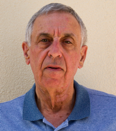 |
Team Responsibilities Portal Coordinator / Software Designer / Programmer Institutional Affiliation Arava Institute (volunteer) Professional Interests Internet application design & development / Data Science |
||||
| Jim Bellis, PhD | |||||
| Information Technology Specialist | |||||
 |
Team Responsibilities Irrigation Water Quality Consultant / Agriculture Extension Service Advisor Institutional Affiliation University of Arizona / Arava Institute Visiting Scholar Professional Interests Water Quality Microbiology / Extension Services and Education / Food Safety |
||||
| Natalie A Brassill, MS | |||||
| Extension and Research Specialist, Water Quality | |||||
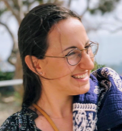 |
Team Responsibilities Water Treatment System Specifications Institutional Affiliations Arava Institute (Intern) / University of British Columbia (graduate student) Professional Interests Hydrogeology / Water Management / Socio-Environmental Entrepreneurship |
||||
| Mikaela Frame, BS | |||||
| Researcher, Business Owner / Entrepreneur | |||||
 |
Team Responsibilities Logistics / Content Development Institutional Affiliation Arava Institute Professional Interests Water Management / Community Development Strategy |
||||
| Ella Fuksbrauner, MA | |||||
| Project Manager | |||||
 |
Team Responsibilities Graphic Design Institutional Affiliation USAID/Washington Professional Interests Videography / Photography / Web Design / Computer Graphics |
||||
| Stewart Grand, BS | |||||
| Lead Multimedia Specialist | |||||
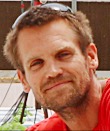 |
Team Responsibilities Soil & Agriculture Advising Institutional Affiliation Arava Institute (Consultant) Professional Interests Biogeochemistry / Agroecology |
||||
| Tom Groenveld, PhD | |||||
| Irrigation & Fertigation Specialist | |||||
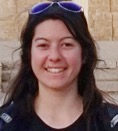 |
Team Responsibilities Water Quality Data Researcher Institutional Affiliation Arava Institute (Intern) Professional Interests Bioanalytical Chemistry / Metabolomics / Nutrigenomics |
||||
| Alexa Hadar, BS | |||||
| Biochemist | |||||
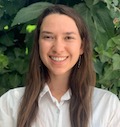 |
Team Responsibilities Content Editor Institutional Affiliation Arava Institute (Intern) Professional Interests Social Entrepreneurship, Rejuvenative Agriculture |
||||
| Moriah Lavey, BA | |||||
| Environmental Justice Specialist | |||||
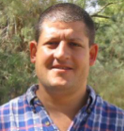 |
Team Responsibilities Principle Investigator / Overall Project Coordinator Institutional Affiliation Arava Institute, Director, Center for Transboundary Water Management Professional Interests Transboundary Water Resources Management, Technology & Policy |
||||
| Clive Lipchin, PhD | |||||
| Water Resources Management & Policy Expert | |||||
 |
Team Responsibilities Water Specialist / Website Design Institutional Affiliation Tel Aviv University, Department of Public Policy Professional Interests Science-Policy Integration for Sustainable Water Treatment Solutions |
||||
| Amanda Lounsbury, PhD | |||||
| Post-Doctoral Fellow - Water Policy | |||||
Page last updated: Tue 11 May 2021
